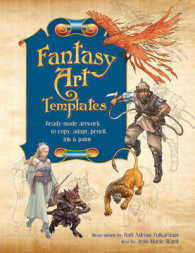- ホーム
- > 洋書
- > 英文書
- > Science / Mathematics
Full Description
This fascinating narrative history of math in America introduces readers to the diverse and vibrant people behind pivotal moments in the nation's mathematical maturation.
Once upon a time in America, few knew or cared about math. In Republic of Numbers, David Lindsay Roberts tells the story of how all that changed, as America transformed into a powerhouse of mathematical thinkers. Covering more than 200 years of American history, Roberts recounts the life stories of twenty-three Americans integral to the evolution of mathematics in this country. Beginning with self-taught Salem mathematician Nathaniel Bowditch's unexpected breakthroughs in ocean navigation and closing with the astounding work Nobel laureate John Nash did on game theory, this book is meant to be read cover to cover.
Revealing the marvelous ways in which America became mathematically sophisticated, the book introduces readers to Kelly Miller, the first black man to attend Johns Hopkins, who brilliantly melded mathematics and civil rights activism; Izaak Wirszup, a Polish immigrant who survived the Holocaust and proceeded to change the face of American mathematical education; Grace Hopper, the "Machine Whisperer," who pioneered computer programming; and many other relatively unknown but vital figures. As he brings American history and culture to life, Roberts also explains key mathematical concepts, from the method of least squares, propositional logic, quaternions, and the mean-value theorem to differential equations, non-Euclidean geometry, group theory, statistical mechanics, and Fourier analysis. Republic of Numbers will appeal to anyone who is interested in learning how mathematics has intertwined with American history.
Contents
Introduction
Chapter 1. A Practical Navigator: Nathaniel Bowditch, 1806
Chapter 2. Hudson River School: Sylvanus Thayer, 1815
Chapter 3. Political Arithmetic: Abraham Lincoln, 1826
Chapter 4. Textbook Messages: Catherine Beecher and Joseph Ray, 1832
Chapter 5. Learning to Count: J. Willard Gibbs, 1841
Chapter 6. Naval Reserve: Charles H. Davis, 1857
Chapter 7. General Principles: Daniel Harvey Hill, 1862
Chapter 8. Fellow Worker: Christine Ladd-Franklin, 1878
Chapter 9. Straddler: Kelly Miller, 1887
Chapter 10. Frontiersmen: Herman Hollerith and E. H. Moore, 1893
Chapter 11. Poetic Historian: E. T. Bell, 1906
Chapter 12. Man of School Mathematics: Charles M. Austin, 1914
Chapter 13. Organization Man: E. B. Wilson, 1922
Chapter 14. Versed in Math: Lillian R. Lieber and Hugh G. Lieber, 1931
Chapter 15. Machine Whisperer: Grace Hopper, 1941
Chapter 16. Survivor: Izaak Wirszup, 1956
Chapter 17. Carrying Old Virginny Forward: Edgar L. Edwards Jr., 1960
Chapter 18. Americano: Joaquin Basilio Diaz, 1974
Chapter 19. Math Warrior: Frank B. Allen, 1984
Chapter 20. Suspicious Minds: John F. Nash Jr., 1994
Conclusion
Acknowledgments
Selected Bibliography
Index








